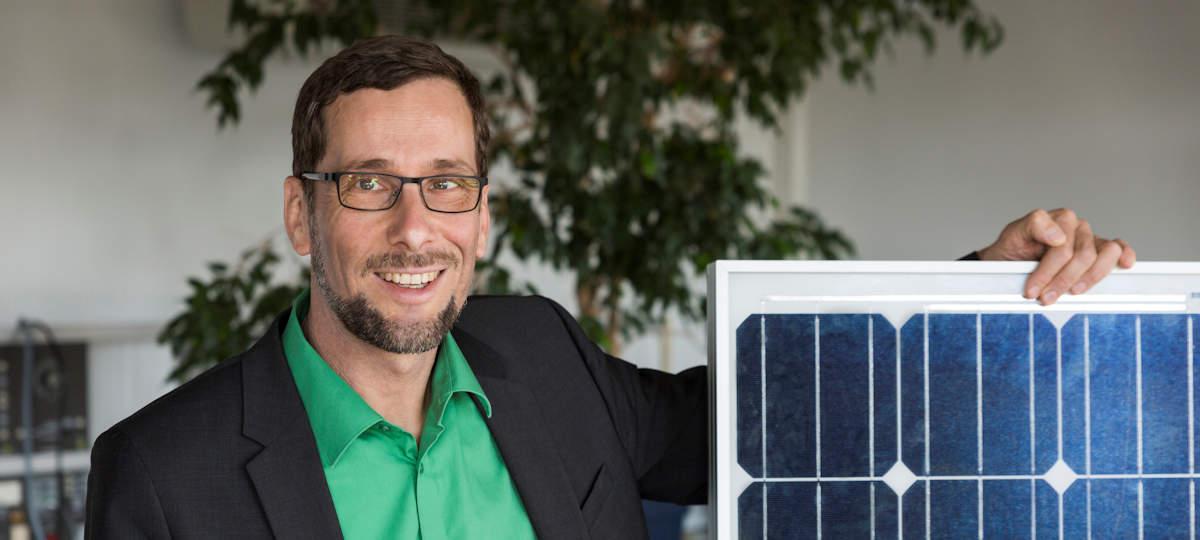
Vita of Volker Quaschning
| since 2004 | Professor for renewable energy systems at the Berlin University of Applied Sciences HTW Berlin, spokesman for the renewable energy programme |
| 1999-2004 | Project manager for solar system analysis at German Aerospace Center DLR, Plataforma Solar de Almería, Spain |
| 1996-2000 | Habilitation at Berlin University of Technology TU Berlin on system technology of a climate compatible electricity supply for Germany |
| 1993-1996 | Doctorate at Berlin University of Technology TU Berlin on shading analysis of photovoltaic systems |
| 1988-1993 | Studies of electrical engineering (degree: Dipl-Ing.), Karlsruhe Institute of Technology KIT |
| 1971-1988 | grew up and went to school in Frankfurt am Main |
| 1969 | born in Leonberg |
Scientists for Future
Co-initiator of Scientists for Future.
Books
Renewable Energy and Climate Change
Understanding Renewable Energy Systems
Energierevolution JETZT!
Erneuerbare Energien und Klimaschutz
Regenerative Energiesysteme
Mülltrenner, Müsliesser und Klimaschützer
Web portal
Operation of the independent web portal www.volker-quaschning.de on renewable power and climate protection with about 3,000 visitors daily.
YouTube channel
Operation of a YouTube channel with over a million views per year: youtube.com/c/VolkerQuaschning
Podcast
Operation of a Podcasts (only in German): dasisteinegutefrage.de
Awards
- LinkedIn Top Voices 2020 D-A-CH
- German Solar Price 2020 for personal engagement of Eurosolar
- Scuccessful sicence communication award 2018 of the HTW Berlin
- Energieheld of the Facebook group Europäische Energiewende
- Research award 2012 of HTW Berlin
- Scuccessful sicence communication award 2012 of the HTW Berlin
Positions
- We need an energy revolution and not a lukewarm energy turnaround. A revolution can only come from the citizens.
- In order to comply with the Paris Climate Protection Agreement, we must convert our energy supply to 100 % renewable energies by 2035 at the latest.
- A completely renewable energy supply in Germany is technically and economically feasible.
- The import of green electricity is expensive, currently not available and therefore not an option for fast climate protection.
- Green hydrogen is inefficient and expensive and should only be used where there are no alternatives.
- An exit from coal-fired electricity generation should be aimed for by 2030 at the latest.
- With an installed capacity of 400 GW, photovoltaics can account for around 30 % of the total energy supply in Germany.
- Without the development of storage solutions, the energy transition will soon stall. Decentralized storage systems have the greatest potential.
- We need the fastest possible stop to the construction of new oil and gas heating systems and the production of new gasoline and diesel cars.
- The importance of cables for the energy transition is overestimated.
- Effective climate protection and a rapid energy transition offer enormous opportunities for Germany as a business location with hundreds of thousands of new, sustainable jobs.
- Due to the competitiveness in the end customer sector, photovoltaics will trigger a global energy revolution and can also achieve shares of 50 % and more globally by 2040.
- In addition to the energy turnaround, we also need a food turnaround with a drastic reduction in the consumption of animal foods.